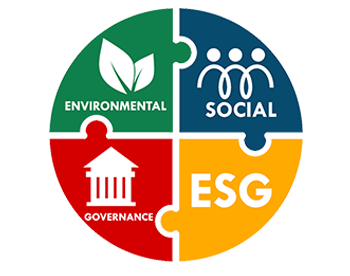 ESG - Environmental, Social and Governance
ESG - Environmental, Social and Governance
Sustainablity Courses
AASTMT Courses in Climate Science and Environmental Sustainability
The Arab Academy for Science, Technology, and Maritime Transport (AASTMT) offers a diverse range of courses focused on climate science, renewable energy, and environmental sustainability, catering to both undergraduate and postgraduate students.
These programs are designed to equip students with the knowledge and practical skills needed to address global environmental challenges and contribute to the achievement of the United Nations' Sustainable Development Goals (SDGs).
These programs are comparable in scope and intent to internationally recognized degrees and they are designed in collaboration with European and international academic institutions. Many of AASTMT’s programs align with the European Credit Transfer and Accumulation System (ECTS) and integrate practical, interdisciplinary training. They comprehensively address key issues such as climate change mitigation, renewable energy integration, environmental risk assessment, pollution control, and marine ecosystem management, making them strong, globally relevant academic pathways for addressing today's urgent environmental challenges.
Key Features of AASTMT's Environmental Programs:
- Interdisciplinary Focus: AASTMT integrates environmental sustainability across multiple disciplines, including architecture, engineering, maritime transport, and more.
- Global Collaboration: Many programs are developed in partnership with international universities and organizations to ensure cutting-edge education.
- Real-world Impact: These courses are designed to empower students to address pressing environmental challenges, particularly in climate change mitigation, renewable energy, and pollution control.
Postgraduate Programs:
- M.Sc. in Renewable Energy and Environmental Engineering
- Description: A comprehensive program developed in cooperation with European universities, following the European Credit Transfer and Accumulation System (ECTS). It totals 60 ECTS credits (24 Egyptian Credit Hours) for coursework and a 30 ECTS credits (12 Egyptian Credit Hours) thesis.
Link: Renewable Energy and Environmental Engineering Program
2.M.Sc. in Environmental Engineering
- Description: Covers critical topics including water quality management, air and marine pollution, waste disposal, environmental impact assessment, and sustainability design. Students are required to complete coursework and a research thesis.
- Link: Environmental Engineering Program Overview
3. M.Sc. in Sustainable Blue Economy and Coastal Resource Management
- Description: This program integrates sustainable practices within the maritime transport sector, emphasizing the sustainable use of marine resources.
- Link: Sustainable Blue Economy Program
4. M.Sc. in Architectural Engineering and Environmental Design
- Description: Focuses on environmentally conscious design with courses covering building technologies, environmental controls, and sustainable design.
- Link: Architectural Engineering Program Details
5. M.Sc. in Environmental Risk Assessment & Management (MPI 772)
- Description: This course provides an in-depth understanding of environmental risk assessment methodologies, including how to identify, analyze, and manage risks associated with environmental hazards. It emphasizes risk management strategies and the application of these concepts to real-world environmental issues.
6. M.Sc. in Marine Environment Sustainable Management (MPI 774)
- Description: This course explores the sustainable management of marine environments, focusing on strategies for preserving marine biodiversity, managing fisheries, and mitigating the impacts of pollution on marine ecosystems. It highlights international policies and conservation efforts.
7. M.Sc. in Management of Pollution Crises (MPI 735)
- Description: This course covers the principles and strategies involved in managing pollution crises. Students learn about emergency response, pollution containment, and the long-term management of environmental contamination, with a focus on both local and global perspectives.
8. M.Sc. in Monitoring, Assessment, and Regulation of Environmental Pollution Management (EG 7201)
- Description: This course examines various methods for monitoring and assessing environmental pollution. Students learn how to evaluate pollution levels, interpret data, and implement regulations designed to protect the environment from harmful pollutants.
9. M.Sc. in Solid Waste and Wastewater Management (EG 7202)
- Description: This course introduces the management of solid waste and wastewater. Topics include waste reduction strategies, recycling, treatment technologies, and sustainable waste management practices to minimize environmental impact.
10. M.Sc. in Air Pollution and Indoor Environmental Quality (EG 7203)
- Description: This course focuses on the sources, types, and impacts of air pollution, both outdoor and indoor. It also explores strategies to improve indoor air quality and mitigate air pollution-related health risks.
11. M.Sc. in Environmental Impact Assessment (EG 7204)
- Description: This course covers the principles and practices of Environmental Impact Assessment (EIA). Students will learn how to assess the potential environmental effects of projects, interpret EIA reports, and recommend mitigation measures to minimize negative environmental impacts.
12. M.Sc. in Geographic Information System and Remote Sensing (EG 7205)
- Description: This course teaches the use of Geographic Information Systems (GIS) and remote sensing technologies for environmental monitoring. Students will learn how to collect, analyze, and interpret spatial data for environmental management and decision-making.
13. M.Sc. in Environmental Laws and Regulations (EG 7206)
- Description: This course provides an overview of the legal framework surrounding environmental protection. Topics include national and international environmental laws, regulations, compliance, and the role of legal mechanisms in environmental sustainability.
14. M.Sc. in Environmental Modeling (EG 7207)
- Description: This course introduces environmental modeling techniques used to predict environmental changes and assess the impacts of human activities. Students learn to apply mathematical models to real-world environmental problems, such as air quality and climate change.
15. M.Sc. in Environmental Toxicology & Risk Assessment (EG 7208)
- Description: This course explores the principles of environmental toxicology and how to assess the risks posed by environmental contaminants. It covers the effects of toxic substances on human health and ecosystems, along with risk assessment frameworks for managing these hazards.
16. M.Sc. in Interdisciplinary Collaboration for Integrating Renewable Energy into Building Design (EG 7209)
- Description: This course focuses on the interdisciplinary approach to integrating renewable energy solutions into building design. Students will learn about energy-efficient building techniques and how to collaborate across disciplines to create sustainable, energy-efficient buildings.
17. M.Sc. in Environmental Engineering Fundamentals
- Description: This course introduces students to the relationship between human activities and environmental sustainability. It covers the history of human impact on the Earth, climate change, water cycles, and sustainable development. Students also learn about green technologies and how they contribute to minimizing environmental degradation.
Undergraduate Programs and Courses:
- Environmental Science & Technology Course
- Description: Aimed at enhancing students' environmental awareness, this course covers the biosphere, ecosystem components, environmental resources, and human impact on the environment.
- Link: Environmental Science & Technology Course
- Meteorology Course (Maritime Transport Technology Basic)
- Description: Equip students with the skills to monitor climate risks and manage early warning systems. This course includes climate change patterns, CO2 emissions, and forecasting extreme weather.
- Link: Meteorology Course Information
- Environmental Science & Technology (Mechanical Engineering - Automotive Engineering)
- Description: This course explores the relationship between human activities and environmental degradation, addressing sustainable development, risk analysis, and environmental management.
- Link: Mechanical Engineering Program Details
- Environmental Pollution Monitoring
- Description: Introduces students to marine pollution, local and international monitoring standards, and the role of monitoring in water, air, and sea pollutants.
- Link: Pollution Monitoring Course
- Maritime Safety and Environmental Protection
- Description: Prepares students for maritime careers, focusing on safety management systems, hazardous situation prevention, and crisis management related to environmental protection.
- Link: Maritime Safety Course
- Architectural Engineering and Environmental Design
- Description: This program integrates environmental controls and sustainable building technologies, providing students with the skills to design energy-efficient buildings while addressing environmental impacts.
- Link: Architectural Engineering & Environmental Design Program
- Environmental & Sanitary Engineering
- Description: Focuses on pollution sources, water quality management, wastewater treatment, and solid waste management. The course also covers industrial waste disposal and hazardous waste management.
- Link: Sanitary Engineering Program Details
- Passive and Active Environmental Control Systems (Master of Engineering)
- Description: This course introduces students to environmental design guidelines, energy consumption software, and methods for minimizing energy loads in buildings, alongside opportunities for active energy generation.
- Link: Environmental Control Systems Course
- Environmental Studies in Architecture and Urban Design
- Description: Focuses on environmentally conscious design principles, including the philosophy of environmental design, natural and built environments, and strategic environmental assessment.
- Link: Environmental Studies in Architecture Course
- Environmental Studies 1 (Architectural Design)
- Description: Explores the impact of buildings on the global environment, energy resources, and the role of sustainable design in reducing energy consumption and mitigating pollution.
- Link: Environmental Studies 1 Course


